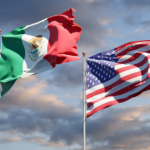In recent years, the global trade landscape has undergone significant changes, and amidst this transformation, the state of Guanajuato, recognized as a leader in footwear production in Mexico, emerges as a strong contender to capitalize on the nearshoring phenomenon. According to Héctor Salgado Banda, Secretary of Finance, Investment, and Administration of the state, Guanajuato is ideally positioned to benefit from this trend.
One data point that highlights this potential is the exponential growth in exports of Guanajuato footwear. Over a little more than a decade, these have risen from around 280 million dollars in 2007 to almost 1 billion dollars by the end of 2023. This notable increase, explained by the state official, reflects the vigor and adaptability of the local industry in the face of global market challenges.
Mauricio Blas Battaglia Velázquez, president of the Chamber of the Footwear Industry of Guanajuato (CICEG), underscores the importance of leveraging nearshoring in a competitive environment where China remains a dominant player. He emphasizes the need for innovation and adding value to products to meet the demands of an increasingly discerning consumer.
With over 70% of total footwear production in Mexico concentrated in Guanajuato, with León leading the way, the industry has contributed more than 53 billion pesos over the last 15 years, according to data provided by Battaglia Velázquez. This leadership has prompted the state government to collaborate with industrial chambers to implement initiatives aimed at enhancing the sector’s international competitiveness.
These initiatives include programs to promote innovation and technological development, as well as access to credits that support companies, which represent a crucial source of employment in the region, with around 6,000 sector companies. However, Battaglia Velázquez also calls for corporate social responsibility, urging companies to prioritize the well-being of their workers and contribute to social development and economic mobility in the communities where they operate.
However, despite these achievements and efforts, the footwear industry in Guanajuato faces considerable challenges, especially related to unfair competition. The massive influx of undervalued goods and irregular products, mainly from China, has created a challenging environment for local manufacturers. According to José Antonio Abugaber Andoni, national president of the Confederation of Industrial Chambers (Concamin), approximately 40% of footwear imports into Mexico are made under conditions of alleged undervaluation.
This issue not only affects the economic stability of the sector but is also reflected in Mexico’s trade deficit with China, which reached 95.575 billion dollars in 2023, according to data from the Ministry of Economy.
The sustained growth of footwear exports in Guanajuato and its potential to benefit from nearshoring are encouraging signs for the local industry. However, it faces significant challenges that require a collaborative approach between the private sector and the government to ensure its continued and sustainable growth in an increasingly competitive and globalized market.







